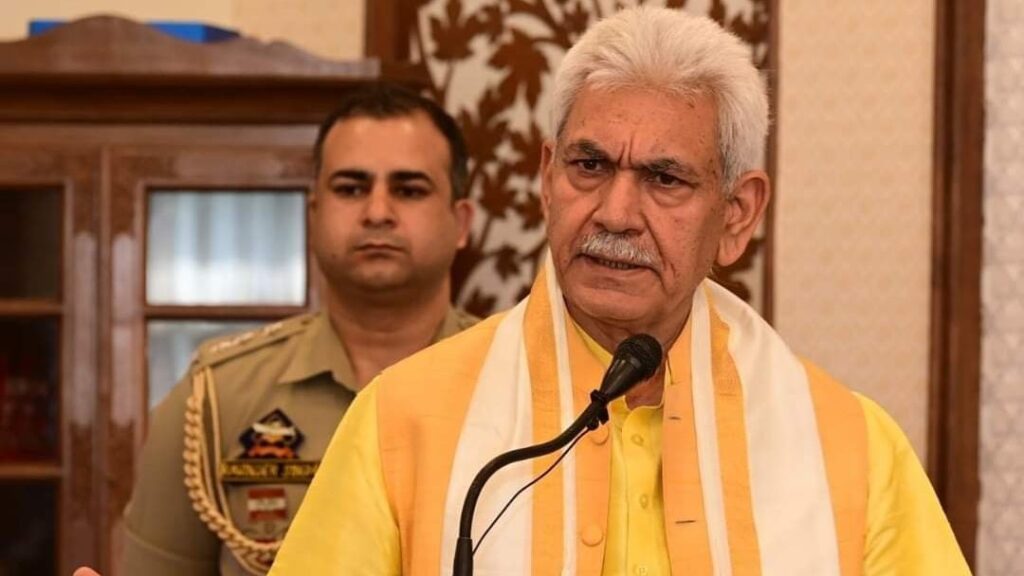THE Centre has described the power vested in the Jammu and Kashmir Lt Governor to nominate five members to its Legislative Assembly as “discretionary”, and exercisable by him without the aid and advice of the Council of Ministers in the Union Territory.
In an affidavit in the Jammu & Kashmir and Ladakh High Court, the Union Home Ministry has also said that this nomination has “no bearing or co-relation with the formation of the government”.
The affidavit was in response to a question framed by the court as to whether Sections 15, 15-A and 15-B of the Jammu & Kashmir Reorganization Act, 2019, providing for nomination of members to the UT’s Legislative Assembly over and above its sanctioned strength – which could potentially convert a minority government into a majority government, and vice-a-versa – were in violation of basic structure of the Constitution.
Senior Congress leader and its chief spokesperson Ravinder Kumar Sharma had filed a PIL in the High Court, challenging the provisions.
Just before results were declared for the first elections held to the J&K Assembly following the abrogation of Article 370, in October 2024, non-BJP parties had expressed apprehension over the L-G’s powers to nominate members. This fear was accentuated by claims of a BJP leader that all five would be BJP leaders, and that L-G Manoj Sinha would name them in consultation with the Centre.
Opposition parties had demanded that the nominations be made only on “the aid and advice” of the government that was due to take over, and not precede it.
With five nominated members, the strength of the J&K Assembly would be 95, making the majority mark 48. It was feared that the Opposition would not reach this mark, and the BJP would tilt the scales in its favour with the nominated MLAs. Eventually, however, the L-G did not make any nominations before the results, and the National Conference-Congress combine won with 47 MLAs (NC 41 and Congress 6), apart from enjoying the support of four Independents and a CPI(M) MLA.
In its affidavit in the High Court, the Union Home Ministry has noted that while Section 15 was part of the original 2019 Reorganization Act, Sections 15A and 15B were added through an amendment in 2023. Section 15A empowers the Lt Governor to nominate two members, one of whom shall be a woman, from the Kashmiri migrant community, while Section 15B provides for nomination of one member from persons displaced from Pakistan Occupied Jammu and Kashmir (PoJK).
Speaking about Section 15, the Centre’s affidavit says that the provision in it for nomination of two women MLAs was similar to an Article in the Constitution of the erstwhile J&K state, before its special status was scrapped. Then the Governor had the power to nominate up to two women members if women were not adequately represented in the Assembly. “(It) is an act of affirmative action, in support of promoting and ensuring female representation.”
A “plain reading” of the statute shows that “it is a nomination which is to take place at any juncture post-elections, and has no bearing or co-relation with the formation of the government, inasmuch as the standard in the section is representation of women in the Assembly, and not in the government”, says the affidavit.
On Section 15A, the affidavit refers to the Supreme Court’s verdict upholding the abrogation of Article 370 in which Justice Sanjay Kishan Kaul wrote an epilogue on the migration of Kashmiri Pandits. “In order to move forward, the wounds need healing… The first step towards this is to achieve a collective understanding of the human rights violations perpetrated both by State and non-State actors, against peoples of the region,” Justice Kaul wrote.
The Centre’s affidavit says that it is a matter of record that multiple regions of Kashmir have remained disturbed for decades, leading to extensive displacement of civilians. “Accordingly, the nomination of two members from the Kashmiri Migrant community under Section 15A serves the objective of providing them with adequate representation, ensuring their voice is heard in the legislative process, and safeguarding their rights and interests,’’ it says.
Similarly, the affidavit talks of Section 15B providing representation to those displaced from PoJK, in 1947 and during the India-Pakistan wars of 1965 and 1971. “It is evident that displacement of these communities prevents them from their democratic participation… thereby necessitating the appointment of a nominated representative to ensure that their interests are not entirely excluded from governance.”
Therefore, the affidavit says, the legislative intent behind these provisions is “well-founded in law and equity”, ensuring that voices of the displaced are neither ignored nor marginalised.
On whether the J&K Lt Governor has to act on the aid and advice of the Council of Ministers or has discretionary powers to nominate the five members, the affidavit says that this stands conclusively settled with respect to the Assemblies of both Puducherry and the Municipal Corporation in NCT of Delhi – the other two UTs with Assemblies.
Sections 15, 15A and 15B specifically recognise the authority of the Lt Governor to nominate Assembly members, the affidavit says, adding that there can be no doubt that he has to exercise this duty in his discretion as a statutory functionary and not as an extension of the government – and thus, act without aid and advice of the Council of Ministers.

